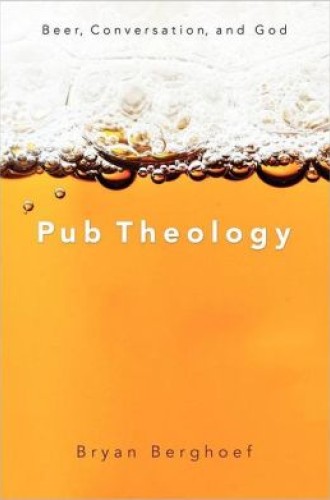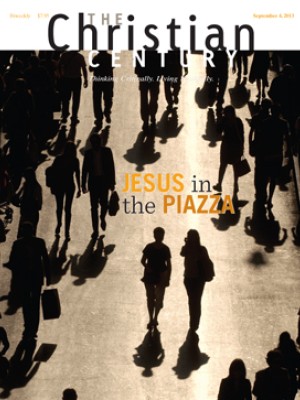Pub Theology, by Bryan Berghoef
Once when I was playing darts with some locals in a tavern, I scored a bull’s-eye, and another player shouted, “Tobias, you’re pure evil!” Immediately tapping my inner Augustine, I responded, “Does evil really exist or is it the absence of good?”
That question immediately sparked a fun debate that reflected genuine interest from my conversation partners at the bar. It was the kind of engagement that professors often wish for in the classroom. Some of the best theological discussions I have experienced have happened in pubs.
Read our latest issue or browse back issues.
In recent years, a number of Roman Catholic dioceses and other Christian denominations and churches in the United States have sponsored Theology on Tap sessions at pubs to reach out to younger adults, many of whom rarely darken a church door. I organized such sessions for a few years at my St. Louis neighborhood watering hole, the Royale, an uncommonly fitting venue given that its walls are adorned with images of figures like Ignatius of Loyola, Dorothy Day, Martin Luther King Jr., Lech Wałęsa, Nelson Mandela, W. E. B. Du Bois and Harriet Tubman. Theology on Tap usually includes a presentation on a topic by a theologian or clergyperson, followed by a question and answer period. However, I think that Bryan Berghoef’s approach is perhaps more palatable for pub patrons.
In this slim, accessible and sometimes witty book (with an eye-catching sudsy front cover designed by Matthew Stock), Berghoef shares helpful lessons imbibed from gatherings he organized at Right Brain Brewery while serving as pastor of Watershed Church in Traverse City, Michigan. Pub theology does not include a lecture by an expert. Although a topic is planned and some stimulating questions are prepared to whet the appetite, these gatherings are about conversation, and anyone who wants to participate is encouraged to do so.
The key ingredient in pub theology is hospitality. It is inspired by Jesus, “who was open, welcoming, and hospitable.” Just as a good brew pub has a variety of items on tap, ranging from stouts and porters to IPAs and lagers, so a pub theology session includes atheists, agnostics, Buddhists, seekers, an assortment of Christians and anyone else who’s interested. Here is a safe place where people can ask or say just about anything. “Good things happen when we sit down at the same table together and talk honestly about things that matter,” Berghoef writes, “and frankly, having a beer doesn’t hurt.”
Berghoef provides a taste of the kinds of questions that stimulate conversation: “Can God change the past?” “Is anything really new?” “What is the Bible?” “What does it mean to know God?” These lead to further questions and to discussions about issues such as whether absolute truths exist, whether humans possess free will and whether everything in the Bible is inspired by God.
Berghoef also offers tips on how to engage in dialogue without making people feel threatened: participants should listen carefully to a question before voicing an answer or proposing a follow-up question, and it is helpful to use provisional language (“From my perspective it seems”) or speak in the third person (“Historic Christianity has tended to say”). Berghoef even cautions readers about attitudes expressed through body language.
He rules one thing out: proselytizing, or imposing one’s view on others. He offers suggestions on how to handle the occasional person who shows up thinking he or she knows all the answers and hijacks the discussion.
As a book, Pub Theology is like light beer, though it is flavored with insights from such thinkers as Paulo Freire, Slavoj Žižek, Paul Knitter, Brian McLaren, John Caputo and Emmanuel Levinas. A lot of what Berghoef does, in both content and style, is similar to what I attempt to do in basic undergraduate courses: he intends these gatherings to be not only informative but transformative. He hopes that pub theology serves as a forum for conscientization, which, according to Freire, occurs when we open ourselves to the perspectives of others and move from opinion to knowledge, then from knowledge to transformative action in the world. Thus pub theology sessions also address local, national and global problems.
I wonder, though, how formative pub theology is. Does it provide the sort of community that is necessary to shape participants into people who have faith, hope and love even when the going gets tough? Berghoef never claims that pub theology is a substitute for church, but he does write about one participant who, after “taking a sip from his pint glass, . . . looked at me and said, ‘This is my church.’” A friend of mine at the Royale said the same thing about Theology on Tap.
I agree with Berghoef that these gatherings can be “a place to encounter God,” but I hope that participants, whatever their respective traditions, then become part of a community that enables them to play a transformative role in the world’s healing.
Berghoef contends that:
Christians—at least in the West—have had the floor long enough. We have controlled the conversation about God. We have set the parameters for spiritual pursuits. We have attempted to shut down dissenting voices and other approaches to God. The truth is, many are tired of this approach, and are beginning to look elsewhere for spiritual nourishment. Ironically, it may well be that opening ourselves up to the traditions of others is the very thing that helps save our own.
I think he is right. In this post-Christendom and postestablishment era, pub theology might be a gateway for informing participants about their own as well as others’ religious traditions. Some people who have even become disaffected with the Christian faith might come to realize that they prematurely threw their baptism out with the baptismal water.






